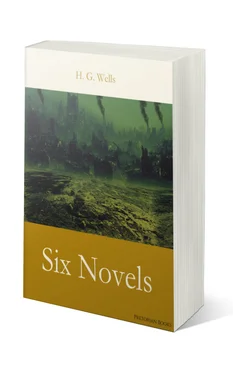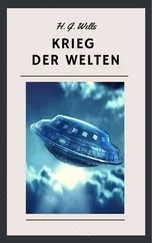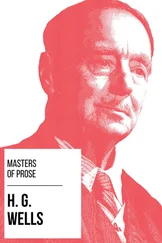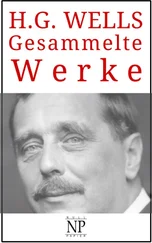H. Wells - H. G. Wells - Six Novels
Здесь есть возможность читать онлайн «H. Wells - H. G. Wells - Six Novels» — ознакомительный отрывок электронной книги совершенно бесплатно, а после прочтения отрывка купить полную версию. В некоторых случаях можно слушать аудио, скачать через торрент в формате fb2 и присутствует краткое содержание. Жанр: unrecognised, на немецком языке. Описание произведения, (предисловие) а так же отзывы посетителей доступны на портале библиотеки ЛибКат.
- Название:H. G. Wells: Six Novels
- Автор:
- Жанр:
- Год:неизвестен
- ISBN:нет данных
- Рейтинг книги:3 / 5. Голосов: 1
-
Избранное:Добавить в избранное
- Отзывы:
-
Ваша оценка:
- 60
- 1
- 2
- 3
- 4
- 5
H. G. Wells: Six Novels: краткое содержание, описание и аннотация
Предлагаем к чтению аннотацию, описание, краткое содержание или предисловие (зависит от того, что написал сам автор книги «H. G. Wells: Six Novels»). Если вы не нашли необходимую информацию о книге — напишите в комментариях, мы постараемся отыскать её.
H. G. Wells: Six Novels — читать онлайн ознакомительный отрывок
Ниже представлен текст книги, разбитый по страницам. Система сохранения места последней прочитанной страницы, позволяет с удобством читать онлайн бесплатно книгу «H. G. Wells: Six Novels», без необходимости каждый раз заново искать на чём Вы остановились. Поставьте закладку, и сможете в любой момент перейти на страницу, на которой закончили чтение.
Интервал:
Закладка:
I dismissed my three serfs with a wave of the hand, and went up the beach into the thickets. I carried my pistol in my hand, my whip thrust with the hatchets in the sling of my arm. I was anxious to be alone, to think out the position in which I was now placed. A dreadful thing that I was only beginning to realise was, that over all this island there was now no safe place where I could be alone and secure to rest or sleep. I had recovered strength amazingly since my landing, but I was still inclined to be nervous and to break down under any great stress. I felt that I ought to cross the island and establish myself with the Beast People, and make myself secure in their confidence. But my heart failed me. I went back to the beach, and turning eastward past the burning enclosure, made for a point where a shallow spit of coral sand ran out towards the reef. Here I could sit down and think, my back to the sea and my face against any surprise. And there I sat, chin on knees, the sun beating down upon my head and unspeakable dread in my mind, plotting how I could live on against the hour of my rescue (if ever rescue came). I tried to review the whole situation as calmly as I could, but it was difficult to clear the thing of emotion.
I began turning over in my mind the reason of Montgomery's despair. “They will change,” he said; “they are sure to change.” And Moreau, what was it that Moreau had said? “The stubborn beast-flesh grows day by day back again.” Then I came round to the Hyena-swine. I felt sure that if I did not kill that brute, he would kill me. The Sayer of the Law was dead: worse luck. They knew now that we of the Whips could be killed even as they themselves were killed. Were they peering at me already out of the green masses of ferns and palms over yonder, watching until I came within their spring? Were they plotting against me? What was the Hyena-swine telling them? My imagination was running away with me into a morass of unsubstantial fears.
My thoughts were disturbed by a crying of sea-birds hurrying towards some black object that had been stranded by the waves on the beach near the enclosure. I knew what that object was, but I had not the heart to go back and drive them off. I began walking along the beach in the opposite direction, designing to come round the eastward corner of the island and so approach the ravine of the huts, without traversing the possible ambuscades of the thickets.
Perhaps half a mile along the beach I became aware of one of my three Beast Folk advancing out of the landward bushes towards me. I was now so nervous with my own imaginings that I immediately drew my revolver. Even the propitiatory gestures of the creature failed to disarm me. He hesitated as he approached.
“Go away!” cried I.
There was something very suggestive of a dog in the cringing attitude of the creature. It retreated a little way, very like a dog being sent home, and stopped, looking at me imploringly with canine brown eyes.
“Go away,” said I. “Do not come near me.”
“May I not come near you?” it said.
“No; go away,” I insisted, and snapped my whip. Then putting my whip in my teeth, I stooped for a stone, and with that threat drove the creature away.
So in solitude I came round by the ravine of the Beast People, and hiding among the weeds and reeds that separated this crevice from the sea I watched such of them as appeared, trying to judge from their gestures and appearance how the death of Moreau and Montgomery and the destruction of the House of Pain had affected them. I know now the folly of my cowardice. Had I kept my courage up to the level of the dawn, had I not allowed it to ebb away in solitary thought, I might have grasped the vacant sceptre of Moreau and ruled over the Beast People. As it was I lost the opportunity, and sank to the position of a mere leader among my fellows.
Towards noon certain of them came and squatted basking in the hot sand. The imperious voices of hunger and thirst prevailed over my dread. I came out of the bushes, and, revolver in hand, walked down towards these seated figures. One, a Wolf-woman, turned her head and stared at me, and then the others. None attempted to rise or salute me. I felt too faint and weary to insist, and I let the moment pass.
“I want food,” said I, almost apologetically, and drawing near.
“There is food in the huts,” said an Ox-boar-man, drowsily, and looking away from me.
I passed them, and went down into the shadow and odours of the almost deserted ravine. In an empty hut I feasted on some specked and half-decayed fruit; and then after I had propped some branches and sticks about the opening, and placed myself with my face towards it and my hand upon my revolver, the exhaustion of the last thirty hours claimed its own, and I fell into a light slumber, hoping that the flimsy barricade I had erected would cause sufficient noise in its removal to save me from surprise.
XXI. THE REVERSION OF THE BEAST FOLK.
IN this way I became one among the Beast People in the Island of Doctor Moreau. When I awoke, it was dark about me. My arm ached in its bandages. I sat up, wondering at first where I might be. I heard coarse voices talking outside. Then I saw that my barricade had gone, and that the opening of the hut stood clear. My revolver was still in my hand.
I heard something breathing, saw something crouched together close beside me. I held my breath, trying to see what it was. It began to move slowly, interminably. Then something soft and warm and moist passed across my hand. All my muscles contracted. I snatched my hand away. A cry of alarm began and was stifled in my throat. Then I just realised what had happened sufficiently to stay my fingers on the revolver.
“Who is that?” I said in a hoarse whisper, the revolver still pointed.
“I—Master.”
“Who are you?”
“They say there is no Master now. But I know, I know. I carried the bodies into the sea, O Walker in the Sea! the bodies of those you slew. I am your slave, Master.”
“Are you the one I met on the beach?” I asked.
“The same, Master.”
The Thing was evidently faithful enough, for it might have fallen upon me as I slept. “It is well,” I said, extending my hand for another licking kiss. I began to realise what its presence meant, and the tide of my courage flowed. “Where are the others?” I asked.
“They are mad; they are fools,” said the Dog-man. “Even now they talk together beyond there. They say, ‘The Master is dead. The Other with the Whip is dead. That Other who walked in the Sea is as we are. We have no Master, no Whips, no House of Pain, any more. There is an end. We love the Law, and will keep it; but there is no Pain, no Master, no Whips for ever again.’ So they say. But I know, Master, I know.”
I felt in the darkness, and patted the Dog-man's head. “It is well,” I said again.
“Presently you will slay them all,” said the Dog-man.
“Presently,” I answered, “I will slay them all,—after certain days and certain things have come to pass. Every one of them save those you spare, every one of them shall be slain.”
“What the Master wishes to kill, the Master kills,” said the Dog-man with a certain satisfaction in his voice.
“And that their sins may grow,” I said, “let them live in their folly until their time is ripe. Let them not know that I am the Master.”
“The Master's will is sweet,” said the Dog-man, with the ready tact of his canine blood.
“But one has sinned,” said I. “Him I will kill, whenever I may meet him. When I say to you, ‘That is he,’ see that you fall upon him. And now I will go to the men and women who are assembled together.”
For a moment the opening of the hut was blackened by the exit of the Dog-man. Then I followed and stood up, almost in the exact spot where I had been when I had heard Moreau and his staghound pursuing me. But now it was night, and all the miasmatic ravine about me was black; and beyond, instead of a green, sunlit slope, I saw a red fire, before which hunched, grotesque figures moved to and fro. Farther were the thick trees, a bank of darkness, fringed above with the black lace of the upper branches. The moon was just riding up on the edge of the ravine, and like a bar across its face drove the spire of vapour that was for ever streaming from the fumaroles of the island.
Читать дальшеИнтервал:
Закладка:
Похожие книги на «H. G. Wells: Six Novels»
Представляем Вашему вниманию похожие книги на «H. G. Wells: Six Novels» списком для выбора. Мы отобрали схожую по названию и смыслу литературу в надежде предоставить читателям больше вариантов отыскать новые, интересные, ещё непрочитанные произведения.
Обсуждение, отзывы о книге «H. G. Wells: Six Novels» и просто собственные мнения читателей. Оставьте ваши комментарии, напишите, что Вы думаете о произведении, его смысле или главных героях. Укажите что конкретно понравилось, а что нет, и почему Вы так считаете.












